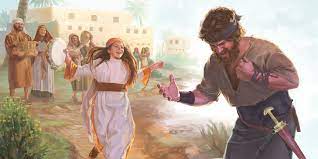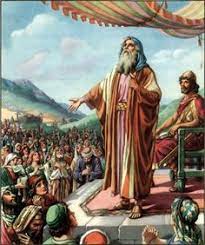Yiftach sent messengers to the king of the people of `Amon to say,
"What's your problem with us?
Why are you invading our territory?"
(Judges 11:12)
Jephthah is an illegitimate son driven from Gilead by his brothers.
Now Yiftach, a brave soldier from Gil`ad, was the son of a prostitute. His father, Gil`ad, had other sons by his wife; and when his wife's sons grew up, they drove Yiftach away and told him, "You will not inherit from our father, because you are another woman's son."
(Judges 11:1-2)
He eventually becomes a successful warlord outside of Gilead.
Then Yiftach fled from his brothers and lived in the territory of Tov, where he enlisted a gang of rowdies who would go out raiding with him. (Judges 11:3)
THE IRONIC REQUEST
When the Ammonites prepare to attack Gilead, the people could not think of anyone better to call upon than the brother they had previously rejected. They go to him and offer to appoint Jephthah as the head of their army. Jephthah found the offer ironic. He made sure to remind his brothers of how they had rejected him! The brothers finally prevail upon Jephthah by offering him total leadership of the region.
After a while the people of `Amon made war against Isra'el. When the army of `Amon attacked Isra'el, the leaders of Gil`ad went to fetch Yiftach from the territory of Tov and said to him, "Come and be our chief, so that we can fight the army of `Amon." Yiftach answered the leaders of Gil`ad, "Didn't you hate me so much that you forced me out of my father's house? Why are you coming to me now, when you're in trouble?" The leaders of Gil`ad replied, "Here is why we've come back to you now: if you lead us in war with the people of `Amon, you will be head over everyone living in Gil`ad." Yiftach answered them, "If you bring me back home to fight the army of `Amon, and Adonai defeats them for me, I will be your head." The leaders of Gil`ad said to Yiftach, "Adonai is witness that we promise to do what you have said." Then Yiftach went with the leaders of Gil`ad, and the people made him head and chief over them. Yiftach repeated all these conditions at Mitzpah in the presence of Adonai.
(Judges 11:6-11)
IN MOSHE'S FOOTSTEPS
As Moshe did before Jephthah in the case of Sihon the Amorite, and in obedience to Deuteronomy 20:10, which says: "When you advance on a town to attack it, first offer it terms for peace." Jephthah makes an attempt at diplomacy. He wants to know the reason for the recent hostilities, as well as establish a roadmap to peace.
Yiftach sent messengers to the king of the people of `Amon to say, "What's your problem with us?
Why are you invading our territory?"
(Judges 11:12)
THE KING OF AMON'S REQUEST: LAND FOR PEACE
The king of `Amon answered the messengers of Yiftach,
"Because Isra'el took away my territory when they came up from Egypt. They took everything from the Arnon to the Yabok and the Yarden. Now, restore it peacefully."
(Judges 11:13)
Now, there might have been a kernel of truth. Three hundred years prior, Israel did take over lands that the Ammonites had already previously lost. Whereas that was certainly a fact, the king of Amon took that small kernel of reality and turned it into a cornfield of fiction that Jephthah counterclaimed with historical, documented truth. (Things haven't changed!)
Yiftach sent messengers again to the king of the people of `Amon with this response, "Here is what Yiftach has to say: 'Isra'el captured neither the territory of Mo'av nor the territory of the people of `Amon. But when Isra'el came up from Egypt, walked through the desert to the Red Sea and arrived at Kadesh, then Isra'el sent messengers to the king of Edom, to say, "Please let us pass through your land." But the king of Edom wouldn't let them. He sent a similar message to the king of Mo'av, but neither would he, so Isra'el stayed at Kadesh. Then they walked through the desert, around the territory of Edom and the territory of Mo'av, past the east border of the territory of Mo'av, and pitched camp on the other side of the Arnon; but they did not cross the border into Mo'av, for the Arnon was the border of Mo'av. Isra'el sent messengers to Sichon king of the Emori and king of Heshbon with this message, "Please let us pass through your land to our own place." But Sichon did not trust that Isra'el would only pass through his land, so he gathered all his people together, pitched camp in Yahatz and fought against Isra'el. Adonai the God of Isra'el handed Sichon and all his people over to Isra'el, and they killed them. Thus Isra'el possessed all the territory of the Emori who lived there. They took possession of all the territory of the Emori from the Arnon to the Yabok and from the desert to the Yarden. So now that Adonai the God of Isra'el has expelled the Emori before his people Isra'el, do you think that you will expel us? You should just keep the territory your god K'mosh has given you; while we, for our part, will hold onto whatever Adonai our God has given us of the lands that belonged to others before us. Really, are you better than Balak the son of Tzippor, king of Mo'av? Did he ever pick a quarrel with Isra'el or fight with us? Isra'el lived in Heshbon and its villages, in `Aro`er and its villages and in all the cities on the banks of the Arnon for three hundred years. Why didn't you take them back during that time? No, I have done you no wrong. But you are doing me wrong to war against me. May Adonai the Judge be judge today between the people of Isra'el and the people of `Amon.' "
(Judges 11:14- 27)
The king wouldn't have it. Even the logical recitation of historical facts failed to convince him. He essentially said, "My mind is made up; don't confuse me with the facts!"
But the king of the people of Amon paid no attention to the message Yiftach sent him. (Judges 11:28)
THE RISING OF JUDGE JEPHTHAH
With failed negotiations behind him, Jephthah raises an army that encamps at Mitzpah in preparation for war.
Then the spirit of Adonai came upon Yiftach; and he passed through Gil`ad and M'nasheh, on through Mitzpeh of Gil`ad, and from there over to the people of `Amon. (Judges 11:29)
AN UNFORTUNATE VOW
Yiftach made a vow to Adonai:
"If you will hand the people of `Amon over to me, then whatever comes out the doors of my house to meet me when I return in peace from the people of `Amon will belong to Adonai; I will sacrifice it as a burnt offering." So Yiftach crossed over to fight the people of `Amon, and Adonai handed them over to him. He killed them from `Aro`er until you reach Minnit, twenty cities, all the way to Avel-K'ramim; it was a massacre. So the people of `Amon were defeated before the people of Isra'el.
(Judges 11:30-33)
HaShem was with Jephthah who defeated Amon and returned to Israel the territories that belonged to it. The story goes on to tell us that Jephthah's own daughter was the first to come out to greet him. Jewish sages have often wondered why this man who knew Israel's history so well didn't know the Levitical laws that say that HaShem abhors human sacrifices. Rabbi Yochanan offers Leviticus 27:4, where she who has been vowed to Adonai could be redeemed with thirty shekels of silver. Some also suggest that Jephthah may have fulfilled his vow by giving his daughter to the priesthood.
In any case, this text leaves a dark cloud on the legacy of this hero mentioned in the Book of Hebrew's Hall of Fame:
What more should I say? There isn't time to tell about Gid`on, Barak, Shimshon, Yiftach, David, Sh'mu'el and the prophets; who, through trusting, conquered kingdoms, worked righteousness, received what was promised, shut the mouths of lions, quenched the power of fire, escaped the edge of the sword, had their weakness turned to strength, grew mighty in battle and routed foreign armies.
(Hebrews 11:32-34)
This dark cloud may have a silver lining when one remembers the famous Talmudic citation that the deaths of innocent victims provide redemption for the sinner. The Father gave His son who died the innocent victim death so we could be redeemed. Could it be then that whether by being wrongfully and literally offered, or by being given to the priesthood, Jephthah's voluntary gift of his daughter constituted the sacrifice of the innocent victim, which God honored and thereby gave victory to the nascent country of Israel?
The rabbis often mention that with good, scholarly Torah leadership, Jephthah could have nullified the vow or even carried the consequences of breaking it. As a man of blessed integrity, Jephthah was bound to his word, something we can all learn from. His willingness to carry out his foolish vow shows us the seriousness of unchecked speech and unprayerful promises. It is also a testimony of the seriousness of fulfilling vows and a reminder of why many rabbis agreed with King Solomon, who said:
Better not to make a vow than to make a vow and not discharge it. Don't let your words make you guilty, and don't tell the temple official that you made the vow by mistake. Why give God reason to be angry at what you say and destroy what you have accomplished?
(Ecclesiastes 5:5-6)
Our own rabbi Yeshua went even further concerning the seriousness of breaking vows, saying:
"Again, you have heard that our fathers were told, 'Do not break your oath,' and 'Keep your vows to Adonai.' But I tell you not to swear at all -- not 'by heaven,' because it is God's throne; not 'by the earth,' because it is his footstool; and not 'by Yerushalayim,' because it is the city of the Great King. And don't swear by your head, because you can't make a single hair white or black. Just let your 'Yes' be a simple 'Yes,' and your 'No' a simple 'No'; anything more than this has its origin in evil.
(Matthew 5:33-37)
NO KING IN ISRAEL ...
This is one of the many stories that constitute the Book of Judges, a book where four times we are reminded that there was no king in Israel (Judges 17:6; 8:1; 18:1; 21:25). The last one of these passages tells us that this lack of leadership was the reason everyone did what was right in their own eyes.
It has been said that even bad leadership is better than no leadership. A country without leadership is in a sad state of affairs where error and drama prevail. It would be several decades later that king Saul would be the first to unite the country and give it some sort of cohesion until the arrival of King David.
AS THE MESSIANIC COMMUNITY TODAY . . .
Our messianic community seems to suffer from the same fate today. Because we do not have a visible, tangible king with us, we are often bound to pride, vanity, and error, as everyone does that which is right in their own eyes.
MAY THE KING COME SOON AND QUICKLY,
EVEN IN OUR DAYS!



 RSS Feed
RSS Feed